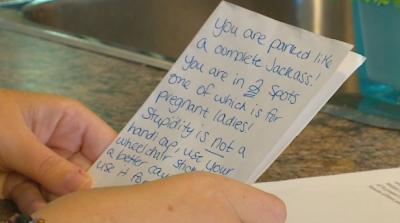Obviously, any kind of discrimination against kids and adults with disabilities is troubling. But two recent headline-making incidents have me mulling over blatant discrimination vs. the cowardly kind.
“You are parked like a complete jackass!” read the note left on the windshield of a wheelchair van lift belonging to Desiree Parisien, who has muscular dystrophy and lives in Saskatoon, Canada. “You are in two spots, one of which is for pregnant ladies! Stupidity is not a handicap, use your wheelchair sticker for a better cause. Don’t use it for an excuse.”
Because Parisien drives a side-ramp van, she typically requires more room than the usual wheelchair parking spots provide. It’s not the first time she’s gotten these sort of notes, she’s said. “Fundamentally, it shows that there is a sea of non-understanding in the ambulatory world,” said Judge David M. Arnot, Chief Commissioner of the province’s Human Rights Commission. Not to mention non-decency.
Then there’s the story of Lexi Haas, an 11-year-old girl who has kernicterus, a form of brain damage caused by excessive jaundice. As her father, Dr. Ken Haas, told CBS news, the family was in Savannah, Georgia on a trip and went to visit the Ships of the Sea Museum. They were stopped at the doorway by an employee, who said Lexi’s wheelchair was too dirty to come inside. Lexi was permitted to use a wheelchair owned by the museum, but she couldn’t because it lacked straps to hold her up. The family was then told Lexi could sit outside and watch a video while the rest of the family went through the museum. Eventually, the museum sent a letter of apology to the family, noting that the employee had been dismissed.
Both incidents make you mad and sad if you love someone with disabilities (or have one yourself). But as the parent of a kid with special needs, the windshield-wiper message triggered another emotion: fear. It’s unsettling to hear about awful things people think about those with disabilities, the prejudice they harbor and their utter ignorance—and think about how that someday might affect your child.
The inaccessible places of the world and the people who blatantly discriminate are ones we can rally against. There are laws on our side. We can raise a ruckus, make change happen, get apologies. (This mom, for one, recently spoke out when her daughter with disabilities couldn’t participate in a pageant). But the cowardly people of the world—the anonymous haters who leave nasty messages on windshields, on your blog about your child with special needs or on your YouTube videos—can trigger your worst concerns.
Thanks to social media, stories like this can end up doing good. People who have no idea why a wheelchair van lift would take up two spots may now understand and not cast judgment next time they see that happen. And of course, you can choose to pity the ignorant and the prejudiced for having to live with themselves. As parents, the best we can do is continue to speak out and raise awareness, and hope that we are creating a kinder, more understanding and educated world for our kids.
From my other blog:
A mom seeks justice, and gets an amazing apology
I am officially hired as Max’s spokesperson
Photo of note: CTV News video; photo of Lexi Haas, Facebook

